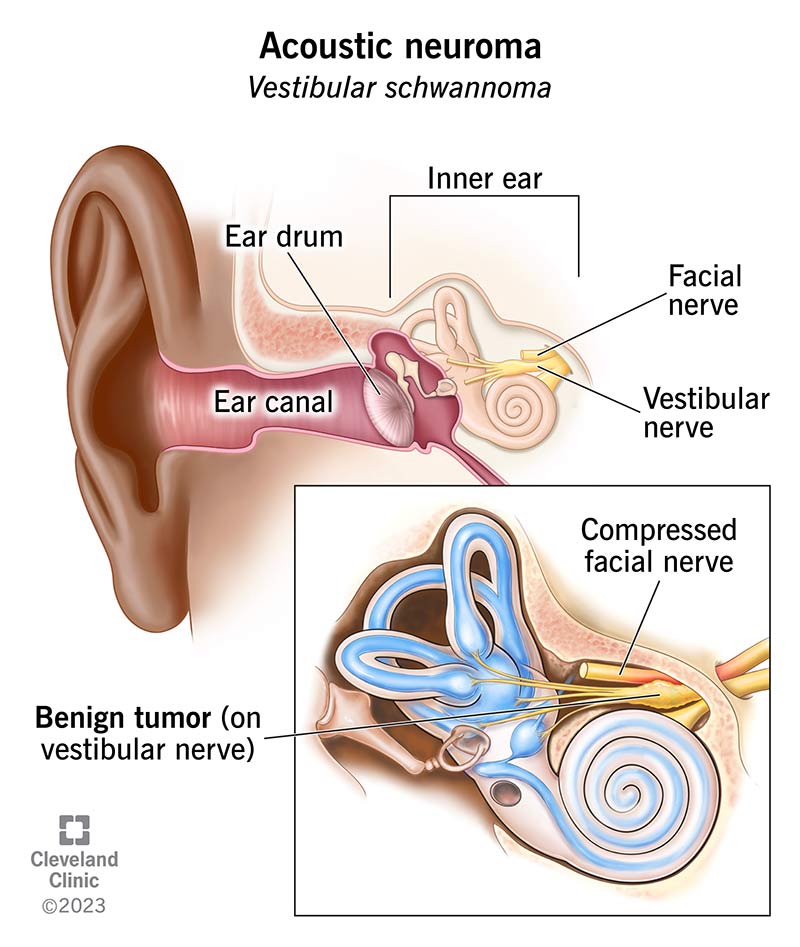Acoustic neuromas (vestibular schwannomas) are benign (noncancerous) tumors that can affect the nerves that help you hear and maintain your balance. Depending on their size and symptoms, your provider may suggest monitoring or surgery.
Advertisement
Cleveland Clinic is a non-profit academic medical center. Advertising on our site helps support our mission. We do not endorse non-Cleveland Clinic products or services. Policy

Image content: This image is available to view online.
View image online (https://my.clevelandclinic.org/-/scassets/images/org/health/articles/16400-acoustic-neuroma)
An acoustic neuroma, also called a vestibular schwannoma, is a noncancerous (benign) ear tumor that affects your hearing and sense of balance. It grows on the nerve that sends signals from your inner ear to your brain. It’s called your 8th cranial nerve (vestibulocochlear nerve).
Advertisement
Cleveland Clinic is a non-profit academic medical center. Advertising on our site helps support our mission. We do not endorse non-Cleveland Clinic products or services. Policy
As acoustic neuromas grow, they can affect hearing, cause ringing in your ear (tinnitus), affect balance, and cause facial weakness or facial numbness. Treatment may include surgery, radiation therapy and, in rare cases, chemotherapy to treat the tumor.
These tumors aren’t common. Each year, about 1 in 100,000 people develop an acoustic neuroma.
Symptoms depend on the tumor’s size and location. Early signs often include hearing loss in one ear and:
Vestibular schwannomas grow very slowly. As they grow, they may cause the following symptoms:
These tumors form when Schwann cells multiply. Schwann cells support and protect the balance and hearing nerves in your peripheral nervous system. Researchers aren’t sure why they multiply.
If you have neurofibromatosis type 2, you may be at an increased risk for a type of vestibular schwannoma called bilateral acoustic neuroma. This tumor affects the hearing (auditory) nerves on both sides of your brain.
While rare, a tumor may grow large enough to be life-threatening. This happens when it presses on the part of your brain that manages the flow of spinal fluid.
Advertisement
To diagnose a vestibular schwannoma, a healthcare provider will ask about your symptoms and do a physical exam. From there, they may recommend several tests, including:
Vestibular schwannoma treatment options include:
Treatments vary depending on factors like:
There are a few different ways surgeons can remove an acoustic neuroma. This depends on the tumor’s size and location. Each approach involves carefully reaching the tumor through your skull and separating it from nearby nerves. Your surgeon will choose the method that’s safest and most effective for your specific case.
Your care team will talk with you about possible complications after surgery, like hearing loss, balance problems, facial weakness or infection. They’ll also explain how to treat or manage these issues, if needed.
If you have an acoustic neuroma, your provider may decide to watch it closely instead of treating it right away. It’s normal to feel nervous or worry that any changes in your hearing or balance mean the tumor is growing. Ask your provider which changes might be a red flag. If you notice these concerning symptoms, let your provider know. They may suggest a different treatment.
You may consider asking your healthcare provider:
Advertisement
That depends on your condition, the type of surgery you have and any possible complications. Your provider will explain your treatment plan and what to expect, including:
Feeling off balance, physically and emotionally, can be hard. Especially when you’re worried about losing your hearing. Acoustic neuromas grow slowly, but reach out to a provider if you notice symptoms. They may recommend watching and waiting instead of starting treatment right away. That’s because treatments like surgery or radiation, while effective, can be tough on your body.
It’s normal to feel anxious. Don’t hesitate to ask questions. No concern is too small. Your care team can help you understand what symptoms to look out for, when treatment might be needed and how to take care of yourself. And if you need emotional support, consider joining a support group or talking with a mental health professional.
Advertisement
Learn more about the Health Library and our editorial process.
Cleveland Clinic's health articles are based on evidence-backed information and review by medical professionals to ensure accuracy, reliability, and up-to-date clinical standards.
Cleveland Clinic's health articles are based on evidence-backed information and review by medical professionals to ensure accuracy, reliability, and up-to-date clinical standards.
A brain or nerve tumor doesn’t always mean you have cancer. Benign growths like schwannomas can be removed with minimally invasive surgery at Cleveland Clinic.
